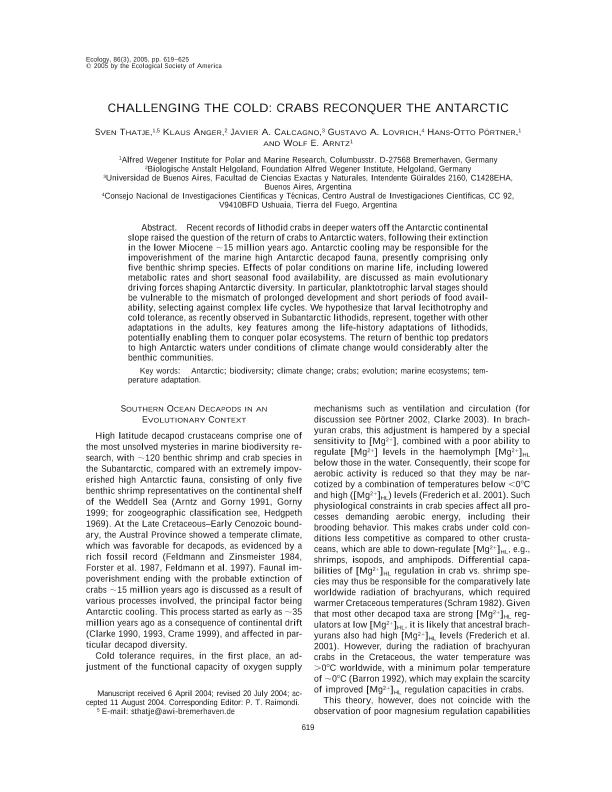Mostrar el registro sencillo del ítem
dc.contributor.author
Thatje, Sven
dc.contributor.author
Anger, Klaus
dc.contributor.author
Calcagno, Javier Ángel

dc.contributor.author
Lovrich, Gustavo Alejandro

dc.contributor.author
Pörtner, Hans Otto
dc.contributor.author
Arntz, Wolf E.
dc.date.available
2022-01-31T14:20:04Z
dc.date.issued
2005-03
dc.identifier.citation
Thatje, Sven; Anger, Klaus; Calcagno, Javier Ángel; Lovrich, Gustavo Alejandro; Pörtner, Hans Otto; et al.; Challenging the cold: Crabs reconquer the antarctic; Ecological Society of America; Ecology; 86; 3; 3-2005; 619-625
dc.identifier.issn
0012-9658
dc.identifier.uri
http://hdl.handle.net/11336/150974
dc.description.abstract
Abstract. Recent records of lithodid crabs in deeper waters off the Antarctic continentalslope raised the question of the return of crabs to Antarctic waters, following their extinctionin the lower Miocene ;15 million years ago. Antarctic cooling may be responsible for theimpoverishment of the marine high Antarctic decapod fauna, presently comprising onlyfive benthic shrimp species. Effects of polar conditions on marine life, including loweredmetabolic rates and short seasonal food availability, are discussed as main evolutionarydriving forces shaping Antarctic diversity. In particular, planktotrophic larval stages shouldbe vulnerable to the mismatch of prolonged development and short periods of food availability,selecting against complex life cycles. We hypothesize that larval lecithotrophy andcold tolerance, as recently observed in Subantarctic lithodids, represent, together with otheradaptations in the adults, key features among the life-history adaptations of lithodids,potentially enabling them to conquer polar ecosystems. The return of benthic top predatorsto high Antarctic waters under conditions of climate change would considerably alter thebenthic communities.
dc.format
application/pdf
dc.language.iso
eng
dc.publisher
Ecological Society of America

dc.rights
info:eu-repo/semantics/openAccess
dc.rights.uri
https://creativecommons.org/licenses/by-nc-sa/2.5/ar/
dc.subject
ANTARCTIC
dc.subject
BIODIVERSITY
dc.subject
CLIMATE CHANGE
dc.subject
CRABS
dc.subject
EVOLUTION
dc.subject
MARINE ECOSYSTEMS
dc.subject
TEMPERATURE ADAPTATION
dc.subject.classification
Otros Tópicos Biológicos

dc.subject.classification
Ciencias Biológicas

dc.subject.classification
CIENCIAS NATURALES Y EXACTAS

dc.title
Challenging the cold: Crabs reconquer the antarctic
dc.type
info:eu-repo/semantics/article
dc.type
info:ar-repo/semantics/artículo
dc.type
info:eu-repo/semantics/publishedVersion
dc.date.updated
2022-01-06T15:03:04Z
dc.journal.volume
86
dc.journal.number
3
dc.journal.pagination
619-625
dc.journal.pais
Estados Unidos

dc.description.fil
Fil: Thatje, Sven. Alfred-Wegener-Institut. Helmholtz-Zentrum für Polar und Meeresforschung; Alemania
dc.description.fil
Fil: Anger, Klaus. Alfred-Wegener-Institut. Helmholtz-Zentrum für Polar und Meeresforschung; Alemania
dc.description.fil
Fil: Calcagno, Javier Ángel. Universidad de Buenos Aires; Argentina. Consejo Nacional de Investigaciones Científicas y Técnicas; Argentina
dc.description.fil
Fil: Lovrich, Gustavo Alejandro. Consejo Nacional de Investigaciones Científicas y Técnicas. Centro Austral de Investigaciones Científicas; Argentina
dc.description.fil
Fil: Pörtner, Hans Otto. Alfred-Wegener-Institut. Helmholtz-Zentrum für Polar und Meeresforschung; Alemania
dc.description.fil
Fil: Arntz, Wolf E.. Alfred-Wegener-Institut. Helmholtz-Zentrum für Polar und Meeresforschung; Alemania
dc.journal.title
Ecology

dc.relation.alternativeid
info:eu-repo/semantics/altIdentifier/url/https://esajournals.onlinelibrary.wiley.com/doi/10.1890/04-0620
dc.relation.alternativeid
info:eu-repo/semantics/altIdentifier/doi/https://doi.org/10.1890/04-0620
Archivos asociados
